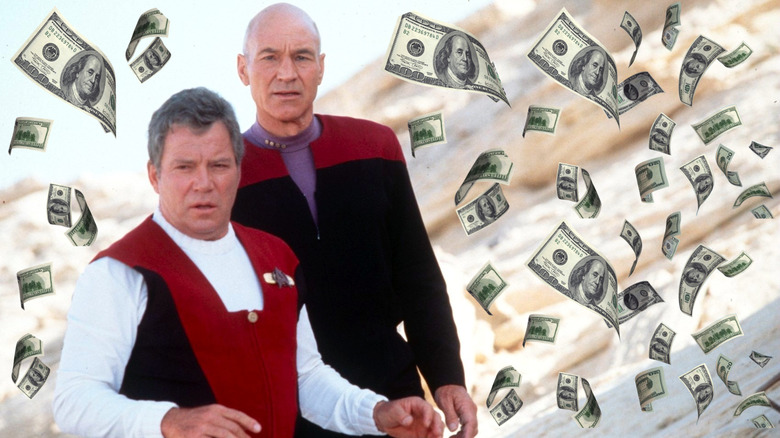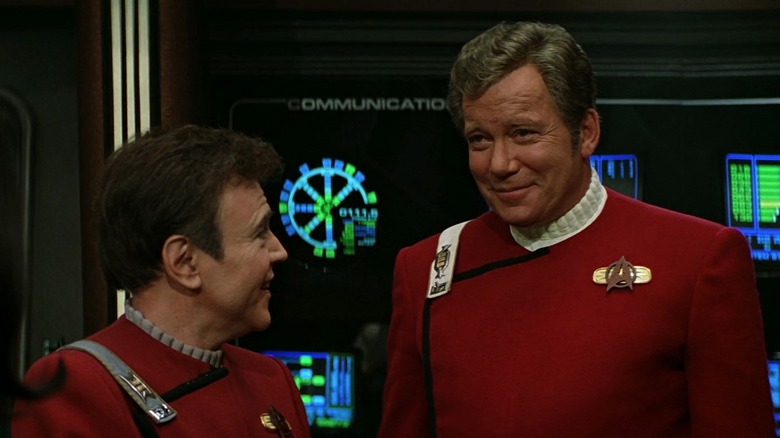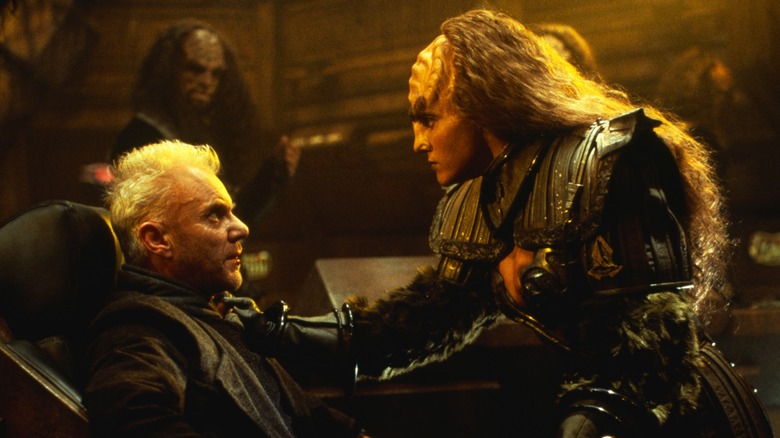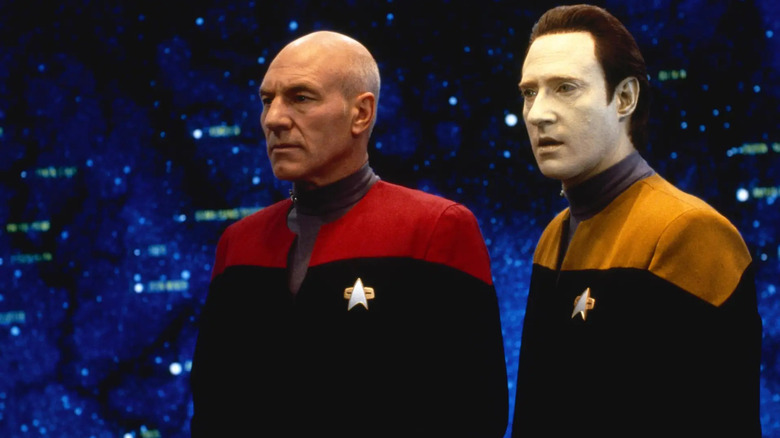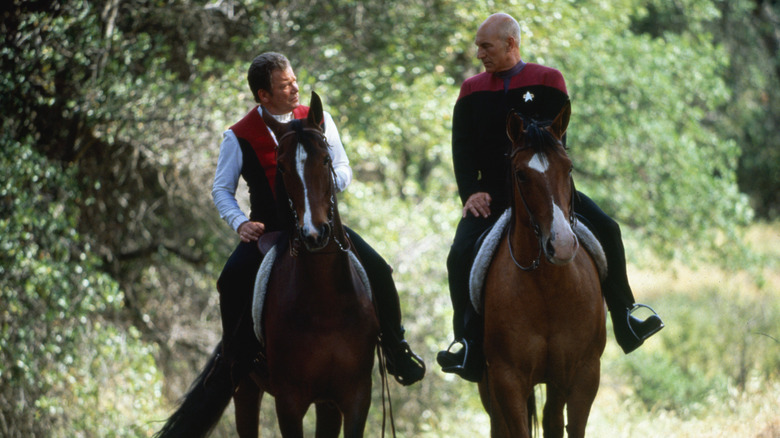30 Years Ago, Star Trek's Most Ambitious Crossover Was Merely A Modest Box Office Hit
(Welcome to Tales from the Box Office, our column that examines box office miracles, disasters, and everything in between, as well as what we can learn from them.)
It almost feels like an unwritten rule that if a franchise exists for long enough, a big crossover must happen. From worlds colliding on the small screen dating back to "I Love Lucy" meeting Superman in "Lucy and Superman" to massive crossovers on the big screen in comic book movies like "The Avengers," it's a tradition in Hollywood that goes back decades. So, inevitably, after nearly 30 years spanning multiple shows and movies, the time came for "Star Trek" to boldly go where it had never gone before.
1994's "Star Trek: Generations" united the two most famous Starfleet captains to ever live; William Shatner's James T. Kirk and Patrick Stewart's Jean-Luc Picard. Despite being separated by decades, science fiction shenanigans allowed these two legends to work together, promising a major cinematic event for longtime Trekkies. The only problem? It didn't have much appeal beyond the hardcore fanbase, which meant it couldn't come close to touching the insanely high highs of something like "Avengers: Endgame." Instead, it had to settle for merely being a decent hit.
In this week's Tales from the Box Office, we're looking back at "Star Trek: Generations" in honor of its 30th anniversary. We'll go over how the film came to be, how the producers had a tough time nailing down the story, the difficulties navigating the various demands of the cast, what happened when the movie hit theaters, what happened in the years that followed, and what lessons we can learn from it in the modern context. Let's dig in, shall we?
The movie: Star Trek: Generations
The film centers on James T. Kirk (William Shatner), now retired from Starfleet. Kirk, along with Scotty (James Doohan) and Chekov (Walter Koenig), are guests of honor aboard the newly christened Enterprise-B. The test run takes an unexpected turn encountering two vessels trapped inside a mysterious energy known as the Nexus. Kirk is swept out into space during an attempted rescue. Decades later, Captain Picard (Patrick Stewart) and the crew of the Enterprise-D save a physicist named Soran (Malcolm McDowell), who harbors a deadly plan. Picard's only hope for a future rests within the Nexus, resulting in a team-up with Kirk.
For context, "Star Trek: The Next Generation" premiered in 1987 and is considered by many to be the best show in the history of the franchise. It served as a huge revival and brought the series to a new generation of fans. While that show was airing, the cast of the original series was busy making several more films, including 1989's "The Final Frontier" and 1991's "The Undiscovered Country."
By 1994, "TNG" had wrapped up its seven-season run and it was time for that cast to make the jump to the big screen. The idea put forth in "Generations" was to formally pass the torch, with the old cast led by Shatner's Kirk formally handing the baton over to the Enterprise crew led by Stewart's Picard. Paramount and producer Rick Berman held something of a "write-off" to find the right story for the first "Star Trek" movie of the "TNG" era. Ultimately, longtime franchise shepherds Ronald D. Moore and Brannon Braga won out. Producer Michael Piller shared his thoughts on the matter in the 2016 book "The Fifty-Year Mission: The Next 25 Years: From The Next Generation to J. J. Abrams." As he wrote:
"From the studio's point of view, it made perfect business sense. Rick was a first-time feature producer, this was the studio's most lucrative franchise — why take a chance on one writer; why not have two scripts written and pick the best one? But from a writer's standpoint, there's something deeply discouraging about knowing that you're writing against someone and that one of you is wasting his or her time."
Putting together Generations was no easy task
Aside from settling on the right writers, various ideas were thrown around regarding how to make this crossover happen. A treatment by producer Maurice Hurley would have been more akin to "Kirk vs. Picard." That didn't pass muster and the powers that be went with the more audience-friendly option. Other ideas, such as bringing back a version of Khan, were also floated but passed on. David Carson was chosen to direct the film after helming several episodes of "Trek" for television. This marked his feature directorial debut.
Carson's hiring was made possible in part because Leonard Nimoy declined to direct the film, in addition to declining a glorified cameo as Spock. "I said there is nothing here I can do so I said 'Thanks, but I'll pass,'" Nimoy said in a 2007 interview. To that end, most of the cast from the original series declined to appear because they simply didn't have all that much to do. That was partially so Paramount could save on the budget. It was ultimately a showcase for Kirk the way things shook out.
It's also important to remember that, by this time, "Star Trek" had become big business. "Deep Space Nine" had begun its run and "Voyager" was just around the corner, in addition to the movies. And all of those projects shared a continuity in the overall timeline. Moore, reflecting in 2016, explained that Paramount had a laundry list of requirements that "Generations" had to meet, which complicated matters.
"When we did 'Generations,' there was literally a list of things that the movie had to accomplish. It had to be a transition from one cast to the other. You could only have the original series cast in the first 10 minutes. It had to have the Klingons in it, it had to have a big villain, it had to have time travel in it. It was all this stuff."
Despite the complications, armed with a healthy (for the time) $35 million budget, Carson wrangled both of these Starfleet captains together for a convoluted sci-fi romp intended to please longtime fans. To what degree they succeeded? That remains up for debate to this day.
The financial journey
It's worth noting that the film wasn't resonating well with audiences in early test screenings. Universal even allegedly tried to sabotage the film before it hit theaters, oddly enough. The '90s were a different time. In any event, Paramount leaned into the epic meet-up between these two beloved characters in the marketing, as that was the big hook here. Two leaders from different times united under bizarre circumstances to defeat a common threat.
Paramount released "Star Trek: Generations" in theaters on November 18, 1994, in the pre-Thanksgiving frame. This can be a lucrative window as the holiday week can result in an uptick in ticket sales. In the early going at least, it worked in this case as the film topped the charts with $23.1 million, besting "Interview with the Vampire" and "The Santa Clause," which were both on their second weekends. Even though reviews were mixed, the core audience showed up.
The problem is that, by the third weekend, the Trekkies had already turned out and the returns were waning. Meanwhile, Disney's "The Lion King," which finished as the biggest movie of 1994 overall, was still bringing in meaningful money months into its theatrical run. This was decades before streaming would be a thing and movies could still have a long shelf life in theaters. "Generations," meanwhile, fell out of the top 10 by Christmas and was largely out of theaters shortly after the calendar rolled over to '95.
All told, the film finished its run with $75.6 million domestically to go with $44.4 million overseas for a $120 million global total. That represents a take of more than three times its production budget, which is unquestionably a win. Given that "TNG" had gone off the air just six months earlier, that's also not bad since audiences could have been prone to thinking along the lines of "We have 'Star Trek' at home." Paramount had to settle for good enough, despite the film's larger ambitions.
A movie with all of the problems (and benefits) of a franchise crossover
On the one hand, this movie probably managed to overcome the lackluster critical response because it had "Star Trek" fans of the past and present interested in seeing their respective Enterprise captain on the silver screen. On the other hand, it also probably suffered a bit by appearing unwelcoming to those who weren't fully steeped in the franchise lore, which by that time had developed into a rather deep well.
"'Generations' was the movie that could have been, but wasn't, pure and simple. It had the chance to be epic and grandiose, and it failed," Steve Vivona wrote for TrekMovie.com in 2019. Indeed, it has always felt to many fans like a great idea with good moments that ended up being a missed opportunity. "Trekkies didn't necessarily want to see Kirk and Picard fighting side-by-side, but even if they did, the fight was lackluster at best," /Film's Witney Seibold said of "Generations" in 2023, calling it the most "useless" of all the "Star Trek" movies.
At the end of the day, this ambitious crossover couldn't rise to the level of larger cultural significance that such events sometimes can. It was much closer to "Alien vs. Predator," in terms of reception and performance than say, "Spider-Man: No Way Home," even if we were to adjust for inflation. But that's also okay because this movie was, on its own terms, successful enough to warrant further "TNG" films. We got three more over the next eight years.
The lessons contained within
In the "franchises are god" era of Hollywood that we've been living in for the better part of the last 20 years, it's easy to look at a big "Star Trek" crossover making $120 million worldwide as a disappointment. From a critical standpoint, fans are allowed to assess it as they please. From a business perspective? It was good business. Any studio today, offered the chance to guarantee three times its budget at the box office, would take those terms. The key here is that, despite the larger ambitions, Paramount did budget "Generations" accordingly.
On the other end of the spectrum, 2016's "Star Trek Beyond" struggled mightily to justify its existence commercially, bringing in just $343 million worldwide against a massive $185 million budget. Paramount was trying to make a movie budgeted like a Marvel movie when these films, even at their peak, never approached that same level of interest from the general public. That's why we haven't had a new "Trek" movie since.
Sometimes, good is good enough, and that's what "Generations" represents. It was a movie made for the fans and those people showed up. It's that simple. Understanding the limitations of a franchise and budgeting films in that franchise accordingly may sound annoyingly simple, but it is logic that seems to be ignored not infrequently. If something happens to break out beyond the intended audience? Great. But planning for the best with no insurance policy when the worst happens is unsustainable.
Paramount is now looking to the future with a new "Star Trek" prequel film. That may offer a new jumping-on point for a new generation of fans, while potentially being of interest to the fans that already exist. Sound familiar? One can only hope that the studio goes back to working with a budget that allows the movie to succeed, even if that success is relatively modest. A win is a win, after all.
